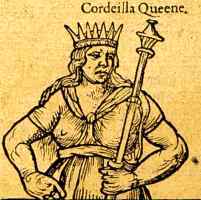King Lear
Shakespeare's main source for his history plays, Holinshed's Chronicles, was also used for the tragedies King Lear, Cymbeline, and Macbeth, stories treated by Holinshed as historical fact*.
Holinshed's account of Lear's reign begins very much as the play does, with the rejection of Cordelia and the division of the kingdom. It is the ending that is different. Reduced in estate* and abused by his daughters, Lear flees to Gallia (France), where he is welcomed with all honour by Cordelia. An army and "great navy" defeat the two usurpers (both Dukes are killed in battle). Lear is triumphantly restored to the throne, and dies two years later. Cordelia also attains the throne, although she eventually meets with a tragic end.*
The Furness Library at the University of Pennsylvania has extensive materials on King Lear.
Footnotes
-
The sources of the source
Holinshed's primary source for the lives of King Lear and Cymbeline was the work of the 12th-century canon-priest Geoffrey of Monmouth (the Historia Regum Britanniae, or History of the Kings of Britain). Monmouth's own sources were oral tradition and earlier manuscripts with a similar basis. Thus, although truth peeps through, these stories are mainly legends that have been embellished by their various chroniclers to glorify English history.
-
Scarcely one servant . . .
But the greatest grief that Lear took was to see the unkindness of his daughters, which seemed to think that all was too much which their father had, the same being never so little; insomuch that, going from the one to the other, he was brought to that misery that scarcely they would allow him one servant to wait upon him.
Holinshed does not mention Lear's madness.
-
Queen Cordelia
Cordelia becomes Queen of the Britons around 807 B.C. and rules "right worthily" for five years, during which time her husband dies. It is then that she meets a tragic end--her two nephews, "disdaining to be under the government of a woman," seize control and imprison her: "wherewith she took such grief, being a woman of manly courage and despairing to recover liberty, there she slew herself."
